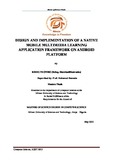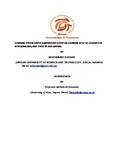| dc.description.abstract | Internet connectivity is one of the fundamental requirements for a successful mobile learning environment. However, within the context of Africa, availability and access, let alone cost, still pose a great challenge in higher education, especially in distance learning. Consequently, there arises a dire need for a native mobile learning application framework that would serve as an alternative to web-based learning environments in localized contexts such as Africa, where the problems of internet connectivity and bandwidth remain untackled.
However, little body of knowledge exists on how such native application frameworks, which leverage the mobile device’s underlying hardware resources and rich user interfaces (UIs) in offering a heightened learning user experience (UX), can be designed and implemented. As a result, this thesis sets out to bridge this gap by proposing a Native Mobile Multimedia Learning Application (NMMLA) Framework, implemented on the Android platform by using a systematic approach we called “Content Flow Algorithm Tree,” which can be leveraged by mobile learning application developers in developing native applications for various higher education courses, especially in science and engineering. The framework is a one-page-setup and do-it-yourself toolkit and library that will facilitate the development of NMMLAs by reducing deployment time or time to market.
Basically, the framework supports five (5) types of multimedia learning content— images, Hypertext Markup Language (HTML), audio, video and simulation—aimed at meeting the different needs of learners with different learning preferences. The framework provides a number of key features, which include theme, course, quiz and simulation menus; listview and tabview render modes; and Search and Help utilities. This work will benefit researchers and stakeholders in the m-learning field, especially Higher Education Institutions (HEIs), training and learning organizations. It will also benefit multimedia learning content developers and providers in general and on the Android platform in particular by preventing them from reinventing the wheel. Above all, it will benefit teachers, students and workers, especially distance learners, in the pursuit of life-long formal and informal learning, as they will be able to learn anywhere and anytime without internet connectivity and limited bandwidth being a barrier. | en_US |


